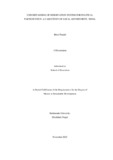
Please use this identifier to cite or link to this item:
https://hdl.handle.net/20.500.14301/349| Title: | Understanding of Reservation System for Political Participation: A Case Study of Local Government, Nepal. |
| Authors: | Paudel, Hritul |
| Citation: | Paudel,H.(2023). Understanding of reservation system for political participation: a case study of local government, Nepal |
| Issue Date: | Nov-2023 |
| Publisher: | Kathmandu University School of Education |
| School: | SOED |
| Department: | DODE |
| Level: | Masters |
| Program: | KUMSD |
| Abstract: | Nepal's federalization journey has encountered obstacles in establishing political trust and cultivating ethical leadership to strengthen local governance and tackle social disparities. The constitution of Nepal, in 2015 introduced provisions for inclusive political participation, mandating candidacies for women and marginalized groups. While these provisions have enhanced the representation of women and marginalized communities in local government, concerns linger regarding the skills and effectiveness of elected officials. The research used a transformative research design aimed at understanding the transformative impact of equitable representation in local government elected representatives, particularly through the reservation system and its role in achieving inclusive representation. The research site was Bharatpur Metropolitan City in Chitwan District, Nepal, known for its rapid growth, strategic location, and good transportation links, making it a strategic area for studying the impact of the reservation system on local government. This study focused on the impact of Nepal's political reservation system on the participation of women and marginalized groups in decision-making processes and their access to leadership opportunities. The research underlines the positive effects of the reservation system in enhancing the involvement of underrepresented groups in local governance. However, the study also acknowledges concerns regarding the system's potential to promote individuals with questionable qualifications into positions of power, potentially marginalizing more competent and deserving candidates. The study emphasizes the need to strike a delicate balance between ensuring equal access to political positions and upholding the competence and effectiveness of elected officials. It advocates for considering broader socioeconomic factors to ensure that reservation policies effectively benefit those they are intended to empower. In conclusion, the research demonstrates the multifaceted implications of Nepal's political reservation system, highlighting both its positive contributions to addressing historical inequalities and its potential drawbacks. The study emphasizes the importance of continuous refinement, balancing representation with competence, and addressing challenges reserved quota representatives face to ensure the success of reservation policies in Nepal. Keywords: Federalization, Underrepresented, Local governance, Inclusive political participation, Reservation system, Effectiveness, Socioeconomic factors |
| URI: | https://hdl.handle.net/20.500.14301/349 |
| Appears in Collections: | Research Project |
Files in This Item:
| File | Description | Size | Format | |
|---|---|---|---|---|
| WCC_UNDERSTANDING AND STATUS OF RESERVATION TO ENSURE POLITICAL PARTICIPATION_ A CASE STUDY OF BHARATPUR METROPOLITAN CITY.pdf | 747.2 kB | Adobe PDF |  View/Open |
Items in DSpace are protected by copyright, with all rights reserved, unless otherwise indicated.